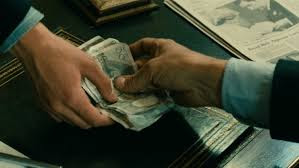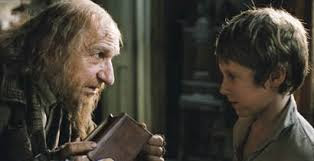The Safdie brothers' Uncut Gems is an ambitious feature that I found alternately rewarding and taxing. The brothers attempt to amplify and broaden their canvas after the success of Good Time, but certain elements remain. Both films have a MacGuffin or Maltese Falcon, an emblem of the greed that motivates the shady figures that populate the Safdies' vision of New York. In Good Time, it was a 7Up bottle filled with acid. In Uncut Gems, it is an uncut opal that sends jeweler and compulsive gambler Adam Sandler careening through the pawn shops and gem stores of Manhattan's Diamond District.
As in Good Time, there is a lysergic edge to the proceedings. Both films contain a black light sequence, though the one in Uncut Gems feels somewhat gratuitous. After a prologue which shows the opal being mined in Africa, the camera takes a trip through the colon of Mr. Sandler's character. A journey that is echoed near the end when the camera journeys through his brain. At such times, it seems that the Safdies flirt with the pretentiousness and portentousness that gifted filmmaker fall prey to after a rousing success. Intolerance, John Ford's The Fugitive, Heaven's Gate, 1941 and, more recently, Magnolia, come to mind. Like those films, Uncut Gems is a distinctive and interesting work that suffers from grandiosity.
The central dramatic problem here is that Adam Sandler's character has burned too many bridges with family, friends and colleagues for there to be any doubt as to his eventual fate. I applaud the courage of the Safdies and Mr. Sandler in remaining true to the film's bleak vision, but the outcome is so over determined as to make the exposition laborious.
A good example is the moment Lakeith Stanfield's character finally breaks with Sandler's character. Instead of embedding the moment in what is largely a well drawn narrative, the Safdies' highlight it with a circle dolly. Mr. Stanfield is up to the dramatic challenge, but it still feels like the Safdies are grandstanding.
Idina Menzel, as Sandler's wife, has a similar moment when Sandler is trying to weasel his way back into her favor. The scene is saved by some good one liners, but, once again, the Safdies undermine their creation by ending scenes with an exclamation point instead of a period. This would be more apt in a mythic film, but Uncut Gems aspires to realism, albeit one blurred by narcotics and sensory overload.
Despite my petty complaints, I still admire the Safdies' moxie. I don't think Uncut Gems is as successful as Good Time, but it has more juice than 90% of American films. Perhaps Mr. Sandler was too perfect a fit for his character. His plunge into the self-hatred of a Jewish man-child without a trace of boyish charm is hard for an audience to sit through for 135 minutes. Uncut Gems entertains with interesting performances, a cheesily enjoyable score and superb editing. Julia Fox's performance as Sandler's mistress is reason enough to see the film. However, Uncut Gems is overstuffed and enervating. I suspect the enervating feel is part of the Safdies' intent, but Uncut Gems suffers from it and artistic overreach just the same.
The central dramatic problem here is that Adam Sandler's character has burned too many bridges with family, friends and colleagues for there to be any doubt as to his eventual fate. I applaud the courage of the Safdies and Mr. Sandler in remaining true to the film's bleak vision, but the outcome is so over determined as to make the exposition laborious.
A good example is the moment Lakeith Stanfield's character finally breaks with Sandler's character. Instead of embedding the moment in what is largely a well drawn narrative, the Safdies' highlight it with a circle dolly. Mr. Stanfield is up to the dramatic challenge, but it still feels like the Safdies are grandstanding.
Idina Menzel, as Sandler's wife, has a similar moment when Sandler is trying to weasel his way back into her favor. The scene is saved by some good one liners, but, once again, the Safdies undermine their creation by ending scenes with an exclamation point instead of a period. This would be more apt in a mythic film, but Uncut Gems aspires to realism, albeit one blurred by narcotics and sensory overload.
Despite my petty complaints, I still admire the Safdies' moxie. I don't think Uncut Gems is as successful as Good Time, but it has more juice than 90% of American films. Perhaps Mr. Sandler was too perfect a fit for his character. His plunge into the self-hatred of a Jewish man-child without a trace of boyish charm is hard for an audience to sit through for 135 minutes. Uncut Gems entertains with interesting performances, a cheesily enjoyable score and superb editing. Julia Fox's performance as Sandler's mistress is reason enough to see the film. However, Uncut Gems is overstuffed and enervating. I suspect the enervating feel is part of the Safdies' intent, but Uncut Gems suffers from it and artistic overreach just the same.























